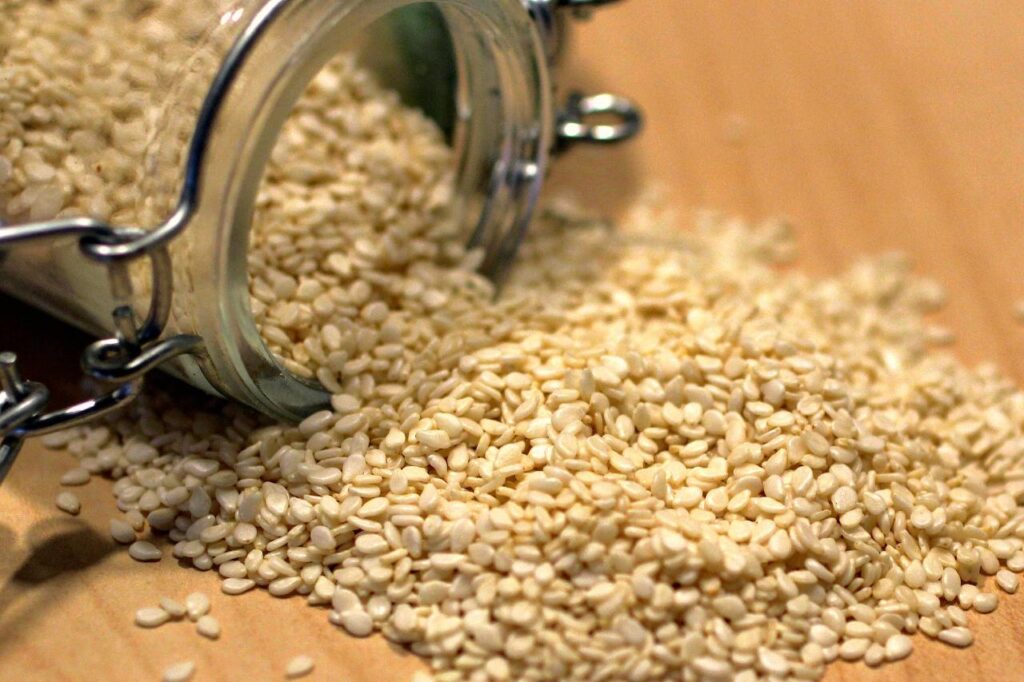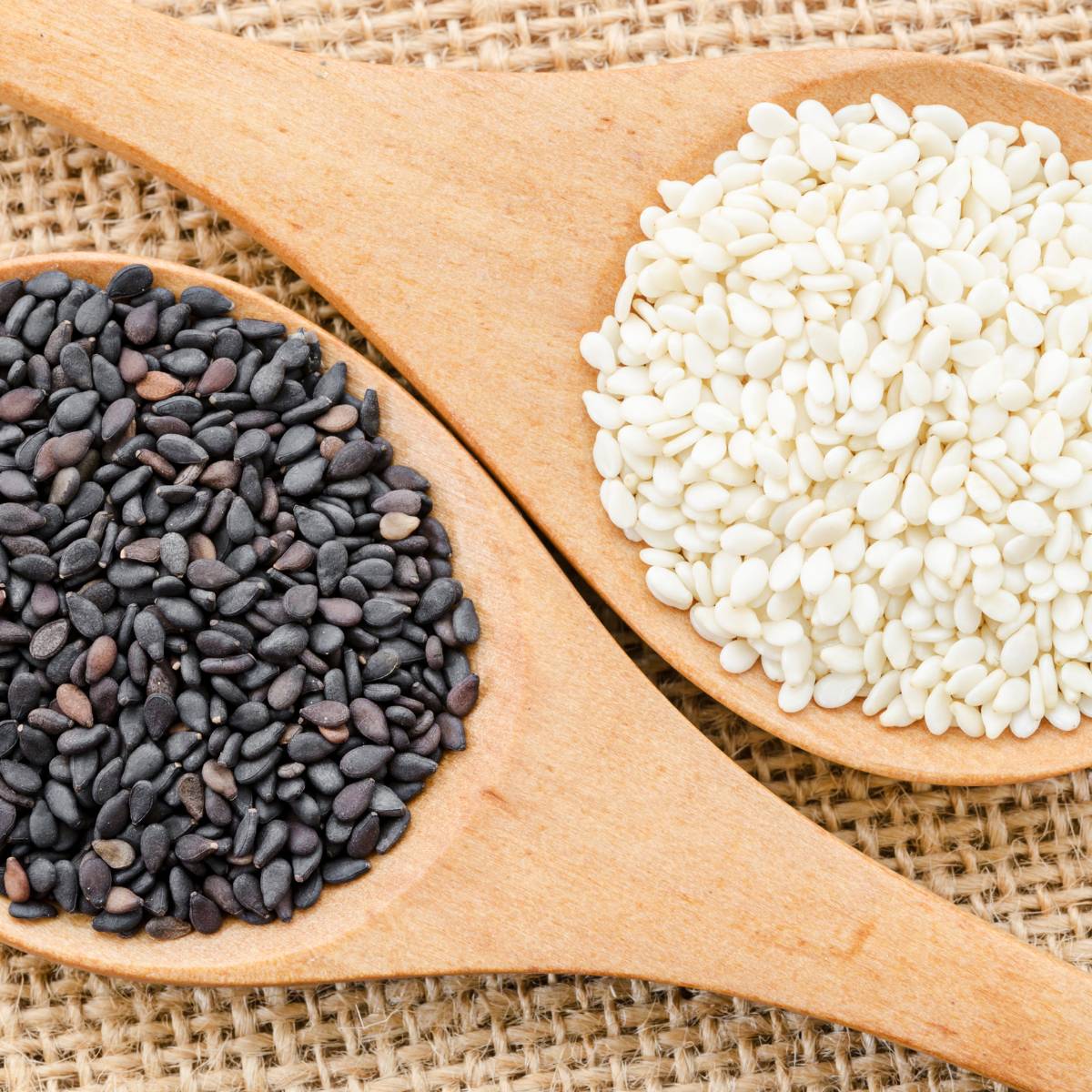Sesame seeds are tiny powerhouses of nutrition, used worldwide in a variety of dishes, from breads and salads to desserts and sauces. As consumers become more aware of their food choices, the debate between organic and conventional sesame seeds has gained attention. What are the differences in terms of health benefits, environmental impact, taste, and cost? Let’s dive deeper into the distinctions to help you make an informed decision.
1. Farming Practices: Organic vs. Conventional Methods
The primary difference between organic and conventional sesame seeds lies in how they are cultivated.
- Organic Farming Practices: Organic sesame seeds are grown using natural farming techniques that avoid synthetic pesticides, herbicides, and fertilizers. Farmers rely on crop rotation, compost, green manure, and biological pest control. These practices not only protect the crops but also maintain and improve soil fertility, enhance water retention, and promote a healthy ecosystem. Organic farms emphasize sustainable methods to ensure long-term productivity without degrading the environment.
- Conventional Farming Practices: Conventional sesame seeds are grown with the help of synthetic chemicals to manage pests, weeds, and diseases and to boost crop yields. Chemical fertilizers are often used to enhance growth, while pesticides and herbicides protect the crops from pests and diseases. While these practices can lead to higher yields and more predictable results, they may leave chemical residues on the seeds, which some consumers prefer to avoid.
Furthermore, conventional farming often employs genetically modified organisms (GMOs) to enhance seed resistance to pests and diseases. Organic farming prohibits GMOs, appealing to consumers who prefer non-GMO products.
2. Nutritional Content and Health Implications
Both organic and conventional sesame seeds are nutrient-dense, packed with protein, healthy fats, fiber, vitamins, and minerals. However, the way they are grown can influence their nutritional profile.
- Nutritional Content: Organic sesame seeds may have a slight edge in terms of nutritional content. Studies suggest that organic farming practices, which rely on natural fertilizers and promote healthier soil, can lead to higher concentrations of certain nutrients, such as antioxidants, polyphenols, and essential minerals. This is due to the fact that organically grown plants often have to develop stronger defense mechanisms against pests, potentially leading to a higher nutrient density.
- Health Implications: Conventional sesame seeds might contain trace amounts of pesticides and chemical fertilizers. While regulatory bodies like the EPA and FDA set maximum residue limits to ensure that they are within safe consumption levels, some consumers prefer organic to avoid potential health risks associated with long-term exposure to these chemicals. People with chemical sensitivities, young children, pregnant women, or those adhering to a strict health-conscious diet might find organic sesame seeds to be a safer option.
3. Environmental Impact: Sustainability Matters
The impact of farming practices on the environment is a significant concern for many consumers.
- Environmental Benefits of Organic Farming: Organic farming methods are generally more sustainable and environmentally friendly. They focus on enhancing biodiversity, preserving soil health, reducing water pollution, and protecting ecosystems. The absence of synthetic pesticides and fertilizers reduces the risk of contaminating local water sources and helps maintain natural habitats. Moreover, organic farms often have richer soil with a better structure and higher water retention capacity, which is crucial for resilience against climate change.
- Environmental Concerns with Conventional Farming: In contrast, conventional farming practices can contribute to soil degradation, water pollution, and loss of biodiversity. The overuse of chemical fertilizers and pesticides can lead to nutrient depletion in the soil, requiring even more inputs to maintain productivity. Pesticides can also harm non-target organisms, including beneficial insects like bees, which are essential for pollination. Additionally, runoff from conventional farms can lead to water pollution, affecting aquatic ecosystems and drinking water sources.
4. Cost Considerations: Organic vs. Conventional Pricing
Cost plays a crucial role in many consumers’ decisions between organic and conventional sesame seeds.
- Higher Costs of Organic Sesame Seeds: Organic sesame seeds generally cost more due to the labor-intensive practices involved in organic farming, such as manual weeding and crop rotation. Certification processes and compliance with organic standards also add to the cost. These factors make organic sesame seeds a premium product, which might not be accessible to all consumers.
- Affordable Conventional Options: Conventional sesame seeds, on the other hand, are typically less expensive. The use of synthetic inputs and large-scale farming techniques often results in higher yields and lower production costs, allowing these products to be sold at more affordable prices. For consumers on a budget or those buying in bulk, conventional sesame seeds may be a more viable option.

5. Health and Safety Concerns: Weighing the Risks
Health-conscious consumers often prioritize safety when choosing between organic and conventional sesame seeds.
- Organic Sesame Seeds and Health Safety: Organic sesame seeds are free from synthetic chemical residues, providing peace of mind for those concerned about potential toxins in their food. The absence of GMOs is another factor that may influence consumers who prefer organic seeds.
- Conventional Sesame Seeds and Regulatory Oversight: Conventional sesame seeds are subject to stringent regulations to ensure that pesticide residues remain within safe limits. For most consumers, these seeds pose no immediate health risk. However, the potential cumulative effects of long-term exposure to low levels of pesticides remain a subject of ongoing research.
6. Taste and Quality: Is There a Noticeable Difference?
While both organic and conventional sesame seeds share a similar nutty flavor, some subtle differences in taste and quality may be attributed to their growing methods.
- Organic Sesame Seeds: Some proponents of organic sesame seeds argue that they offer a cleaner, more robust flavor. The natural growth process may enhance the flavor profile of the seeds, leading to a fresher, richer taste. Additionally, the absence of synthetic chemicals can result in a purer seed that retains its natural aroma and texture.
- Conventional Sesame Seeds: The taste of conventional sesame seeds is also highly valued and widely used in many culinary applications. While most people may not detect a noticeable difference between the two, some argue that the presence of chemical residues, even in trace amounts, can affect the taste over time. However, this is generally a matter of personal preference.
7. Market Availability and Consumer Preferences
The growing demand for organic products has led to an increase in the availability of organic sesame seeds in markets worldwide.
- Availability of Organic Sesame Seeds: Organic sesame seeds are increasingly available in health food stores, organic markets, and online platforms. With the rising trend of clean eating and sustainability, many consumers are willing to pay a premium for organic products.
- Conventional Sesame Seeds and Versatility: Conventional sesame seeds remain the more accessible and affordable option, available in most grocery stores and supermarkets. They are a staple in many households, particularly for those who prioritize cost and convenience.
Conclusion
Choosing between organic and conventional sesame seeds ultimately comes down to individual priorities and values. Organic sesame seeds appeal to those who prioritize environmental sustainability, non-GMO products, and chemical-free foods, while conventional seeds offer a cost-effective and readily available option without major compromises in nutrition or taste. By understanding the differences in farming practices, nutritional content, environmental impact, cost, and taste, you can make a choice that aligns with your health goals, ethical beliefs, and budget.
Whether you opt for organic or conventional, sesame seeds remain a nutritious and delicious addition to your diet, contributing to a healthy lifestyle.
Ajigofarms is a reliable global agricultural purchase sourcing with profound expertise in the manufacturing, and exportation of food crops. We are tested, and trusted suppliers of all kinds of cash crops and food crops. Our constant supply chain solution makes exporting easy, quick, and safe, we are identified with timeliness and meeting up with deadlines. Regardless of the region you are located in worldwide, you can reliably order your Agric products and be rest assured of successful delivery.




